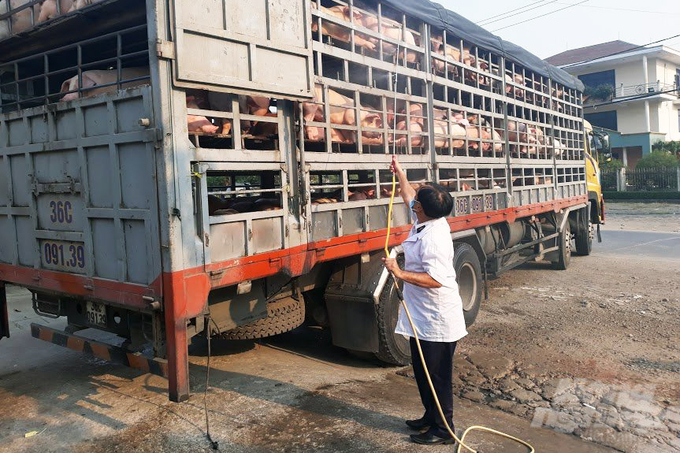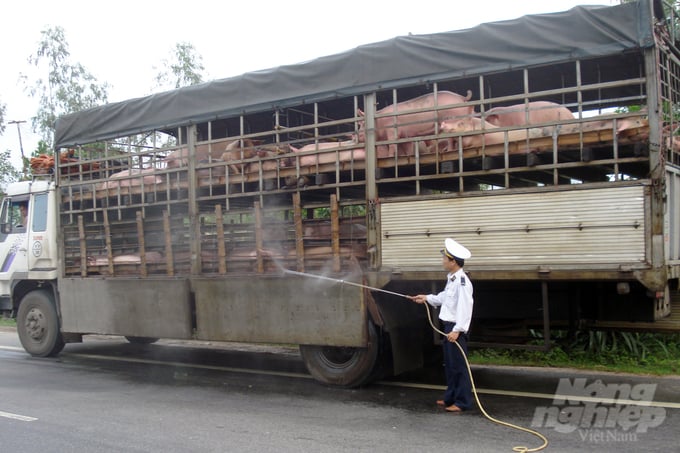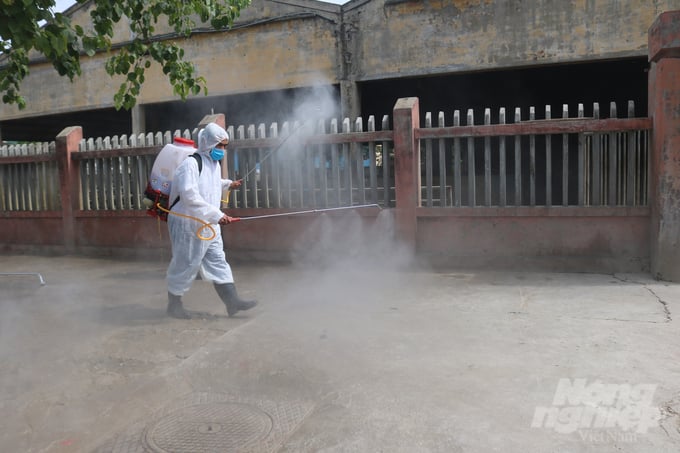November 28, 2025 | 04:19 GMT +7
November 28, 2025 | 04:19 GMT +7
Hotline: 0913.378.918
November 28, 2025 | 04:19 GMT +7
Hotline: 0913.378.918

South Thua Thien - Hue quarantine officers spraying disinfectant on vehicles transporting livestock. Photo: Cong Dien.
Thua Thien - Hue is one of the largely populated localities. In particular, Hue city is the central urban area of the region, so people's daily demand for animal products is immense. The local livestock industry is not developed enough to satisfy the demand. This explains the city’s big imports of both frozen and live animal products from neighboring provinces for consumption, hence more pressure on local management of cattle and poultry diseases.
To carry out inspection and quarantine for livestock and products transported to the locality, Thua Thien - Hue Sub-Department of Livestock Production and Animal Health established 2 checkpoints: the South Thua Thien - Hue quarantine checkpoint (located in Loc Son commune, Phu Loc district), and the North Thua Thien - Hue quarantine checkpoint (located in Phong Thu commune, Phong Dien district).
At each checkpoint, there are regularly 2 staff on duty 24/7 to inspect vehicles transporting livestock and livestock products in and out of the province One of them is the local officer stationed at the checkpoint, and the other is an auxiliary officer from the Sub-department of Livestock Production and Animal Health.

In addition to checking mandatory procedures, vehicles transporting pigs are sprayed with disinfectant before being imported into Thua Thien - Hue. Photo: Cong Dien.
According to Bui Van Tuyen, an officer at the South Thua Thien - Hue quarantine checkpoint, the work at the checkpoint is to conduct inspection and stamp permission to transport livestock from provinces of the Southern region and Central Highland. Slaughterhouses in Thua Thien - Hue mainly import goods from the southern provinces, so officers at the South Thua Thien - Hue quarantine checkpoint are fairly busy, especially during peak holiday periods.
As for the North Thua Thien - Hue quarantine checkpoint, recently there have been cases of smuggled poultry in the Northern provinces, so officers at the checkpoint always remain focused in order not to let vehicles bring livestock from outside the province without being inspected.
“According to regulations, when vehicles transporting livestock from other provinces into Thua Thien - Hue, the checkpoint will be notified. Officers at the checkpoint will conduct clinical examinations to see whether livestock has signs of disease,” said Le van Hoang, an officer working at the North Thua Thien - Hue quarantine checkpoint.
There is also a mandatory requirement. The vehicle owner must present a certificate of disease-free livestock facility or farm meeting veterinary hygiene standards. Pigs must have negative test results for African swine fever before they are allowed to be imported. After completing the inspection, the trunk must be sealed by a veterinary officer. The shipment will be issued with an animal quarantine certificate before being transported to the place of consumption.
Hoang mentions a current problem where vehicle owners still do not declare when importing livestock into the locality. Although there are some isolated cases, the risks of disease spreading are undeniable. To avoid those scenarios, the awareness of vehicle owners remains a prerequisite.

In addition to strictly controlling vehicles transporting livestock into the province, local authorities also focus on spraying disinfectant at slaughterhouses to prevent disease. Photo: Cong Dien.
Director of the Thua Thien - Hue Sub-Department of Livestock Production and Animal Health Nguyen Van Hung said, “Apart from a number of measures such as strict control of slaughterhouses and improving vaccination rates, quarantine work for livestock transported from outside the province is always carried out thoroughly while following procedures, thus ensuring full information about product origin”.
Tight quarantine procedures have brought positive results in local disease prevention work. The proof is that since the beginning of the year, despite complicated developments of the epidemic situation on a national scale, Thua Thien - Hue province has not recorded any cases of dangerous epidemics such as bird flu, foot-and-mouth disease, African swine fever, or even lumpy skin disease.
“Leaders of the Sub-department constantly require officers at quarantine checkpoints to stay vigilant and comply with the full two-way information check on the export and import locations of livestock entering the province. If an epidemic occurs, the unit will closely coordinate with the Traffic Police, Environmental Police, and Market Management officers to organize inspection of the transportation of livestock and livestock products at traffic hubs on National Highway 1A and quarantine checkpoints at both ends of the province to prevent the livestock or poultry disease outbreak," said Director Hung.
Translated by Samuel Pham

(VAN) According to Mr. Vo Minh Thanh, Director of the Tay Ninh Department of Agriculture and Environment, Resolution 57 has created a new development pathway for the locality, shifting from traditional toward modern agriculture.
/2025/11/26/4909-2-154329_878.jpg)
(VAN) Pearl grouper farming in HDPE cages not only delivers economic efficiency but also contributes to protecting the environment, creating jobs, and promoting marine-based experiential tourism.

(VAN) The model of making a living under the forest canopy through the agroforestry system in Van Son commune, Bac Ninh province, is expected to generate an annual income of approximately VND 30 million/ha.

(VAN) Many enterprises in Can Tho are harnessing natural energy and reducing greenhouse gas emissions in their production processes, thereby contributing to the promotion of a sustainable green transition.
/2025/11/24/3536-2-112800_176.jpg)
(VAN) Dong Nai now has tens of thousands of hectares of forests certified for sustainable management, and this area will continue to be expanded in the coming period.

(VAN) Vinh Ha hamlet (Dai Xuyen commune, Hanoi) is shifting away from small-scale farming as households adopt bioscurity into their breeder chicken models.

(VAN) Heavy rains make aquatic species more vulnerable to disease. Proactive water management and high-tech systems help farmers prevent outbreaks and protect yields.